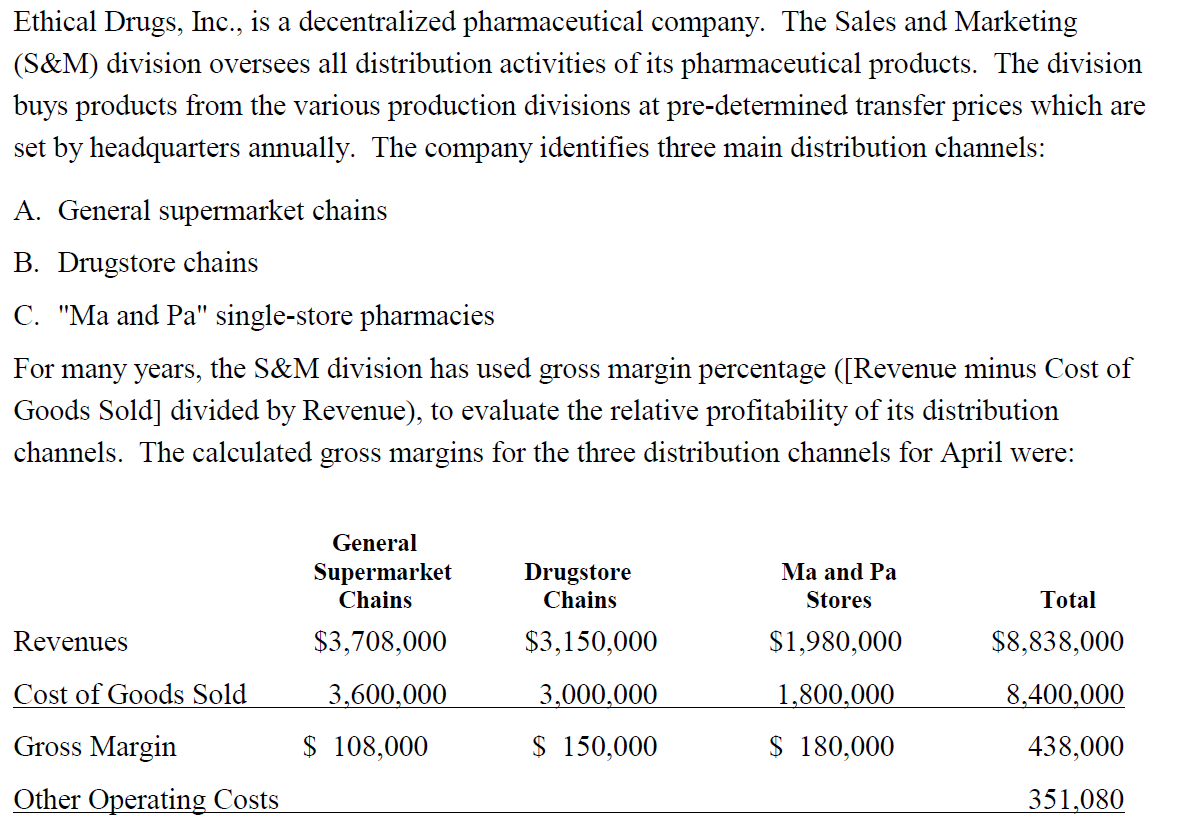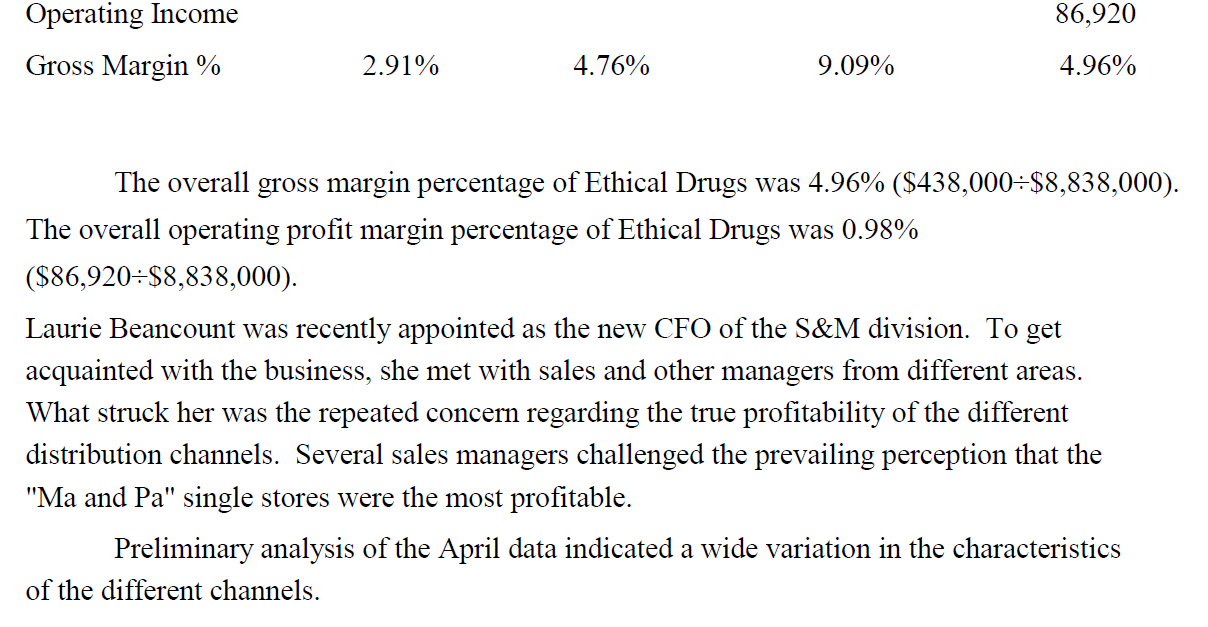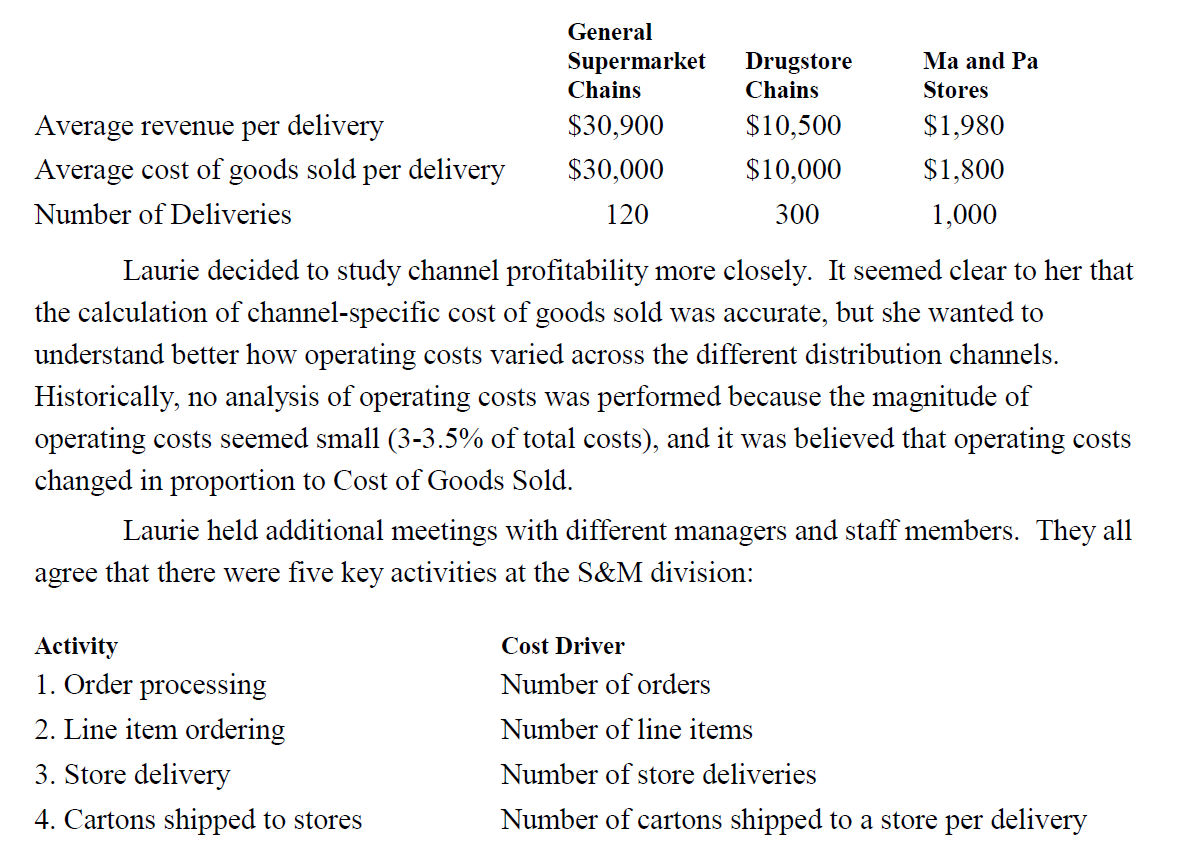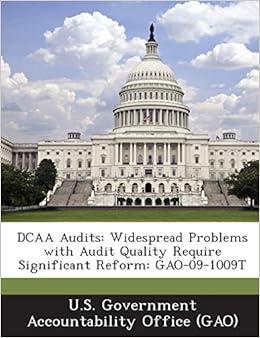







Ethical Drugs, Inc., is a decentralized pharmaceutical company. The Sales and Marketing (S&M) division oversees all distribution activities of its pharmaceutical products. The division buys products from the various production divisions at pre-determined transfer prices which are set by headquarters annually. The company identifies three main distribution channels: A. General supermarket chains B. Drugstore chains C. "Ma and Pa" single-store pharmacies For many years, the S&M division has used gross margin percentage ([Revenue minus Cost of Goods Sold] divided by Revenue), to evaluate the relative profitability of its distribution channels. The calculated gross margins for the three distribution channels for April were: General Supermarket Chains Drugstore Chains $3,150,000 Ma and Pa Stores Total Revenues $3,708,000 $1,980,000 $8,838,000 Cost of Goods Sold 3,600,000 3,000,000 1,800,000 8,400,000 Gross Margin $ 108,000 $ 150,000 $ 180,000 438,000 Other Operating Costs 351,080 86,920 Operating Income Gross Margin % 2.91% 4.76% 9.09% 4.96% The overall gross margin percentage of Ethical Drugs was 4.96% ($438,000-$8,838,000). The overall operating profit margin percentage of Ethical Drugs was 0.98% ($86,920-$8,838,000). Laurie Beancount was recently appointed as the new CFO of the S&M division. To get acquainted with the business, she met with sales and other managers from different areas. What struck her was the repeated concern regarding the true profitability of the different distribution channels. Several sales managers challenged the prevailing perception that the "Ma and Pa" single stores were the most profitable. Preliminary analysis of the April data indicated a wide variation in the characteristics of the different channels. General Supermarket Chains $30,900 $30,000 Drugstore Chains $10,500 $10,000 Ma and Pa Stores $1,980 Average revenue per delivery Average cost of goods sold per delivery Number of Deliveries $1,800 1,000 120 300 Laurie decided to study channel profitability more closely. It seemed clear to her that the calculation of channel-specific cost of goods sold was accurate, but she wanted to understand better how operating costs varied across the different distribution channels. Historically, no analysis of operating costs was performed because the magnitude of operating costs seemed small (3-3.5% of total costs), and it was believed that operating costs changed in proportion to Cost of Goods Sold. Laurie held additional meetings with different managers and staff members. They all agree that there were five key activities at the S&M division: Activity 1. Order processing 2. Line item ordering 3. Store delivery 4. Cartons shipped to stores Cost Driver Number of orders Number of line items Number of store deliveries Number of cartons shipped to a store per delivery 5. Shelf stacking at customer store Number of hours of shelf stacking Each order consists of one or more line items. A line item represents a single product (such as Extra-Strength Tylenol Caplets). Each store delivery entails delivery of 1 or more cartons of products. Each product is delivered in one or more separate cartons. Ethical Drugs delivery staff stack cartons directly onto display shelves in a store. Currently there is no charge for this service and not all customers use Ethical Drugs for this activity. The April operating costs (other than COGS) of the S&M division total $351,080. The costs in each area and the number of units of cost drivers during April are: Activity Area 1. Order Processing 2. Line item ordering 3. Store deliveries 4. Carton deliveries 5. Shelf stacking 6. Corporate SGA Total Costs in April $ 80,000 63,840 71,000 76,000 10,240 50,000 Total Units of Cost Driver in April 2,000 orders 21,280 line items 1,420 store deliveries 76,000 cartons 640 hours unallocated $351,080 Other data for April are: General Supermarket Chains Drugstore Chains Ma and Pa Stores Total number of orders 140 360 1,500 Average number of line items per order 14 12 10 Total number of store deliveries 120 300 1,000 Average number of cartons shipped per store delivery 300 80 16 Average number of hours of shelf stacking per delivery 3 0.6 0.1 Required: 1. Assign the other operating costs to the three distribution channels, using the ABC information. Disregard the $50,000 corporate SG&A cost and only allocate the remaining $301,080. Compute the operating income for each distribution channel. Present the resulting profit margin percentages. 2. What new insights are available from the ABC analysis? What explains the differences in profit margins for the different distribution channels? 3. What decisions would you recommend to top management based on the ABC analysis? 4. Could this sort of analysis be applied to the evaluation of individual customer profitability? What additional information would you need? Laurie Beancount decides further to use the ABC information to examine individual customer profitability within each distribution market. She focuses first on the "Ma and Pa Single-Store" distribution channel. Two customers are used to highlight the new insights available with the ABC approach. Data pertaining to these two customers in April are: Charleston Pharmacy 12 Chapel Hill Pharmacy 10 10 18 6 10 Total number of orders Average number of line items per order Total number of store deliveries Average number of cartons shipped per store delivery Average number of hours of shelf stacking per store delivery Average revenue per delivery Average cost of goods sold per delivery 24 20 0 0.5 $2,400 $2,100 $1,800 $1,650 Required: 1. Use the ABC information to compute the operating income of each customer (Charleston and Chapel Hill) in April. Comment on the results. 2. Laurie ranks the individual customers in the "Ma and Pa" single-store distribution market on the basis of operating income. The cumulative (revised) operating income of the top 20% of customers is $75,680. Ethical Drugs reports negative (revised) operating income of $31,247 for the bottom 40% of its customers. Make recommendations that you think Ethical Drugs should consider in light of this new customer-profitability information














